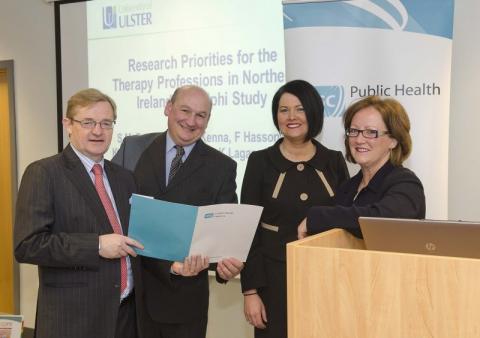Shaping the future: applying therapy research to practice

In these challenging financial times the use of research as a basis for effective health and social care cannot be overstated. ‘Shaping the Future’, a joint Public Health Agency (PHA) and University of Ulster workshop (27 January) takes a fresh look at research within the Allied Health Professions (AHPs) to improve the care and experiences of people across Northern Ireland.
The AHPs provide a wide range of services including physiotherapy, occupational therapy, radiography, podiatry, speech and language therapy and orthoptics.
The nature of their work enables AHPs to carry out research that can rapidly benefit patient care and experience. ‘Shaping the Future’ will look at priorities for new AHP research and consider how existing research can be more effectively shared and used in health and social care development, rather than perhaps being limited to the academic world.
Speaking at the event, Professor Bernie Hannigan, Director of Health and Social Care Research and Development (HSC R&D), a Division of the PHA, said: “A sound base of evidence from research is vital for effective health and social care practice. I welcome this study as an important resource that will help generate new evidence and highlight the potential for existing evidence to be applied in practice. The evidence base points to beneficial innovations that use the most up-to-date knowledge and keep the service user at the centre of care practices. At this event, health and social care policy makers, commissioners, academics and researchers will be able to consider how they can do and use research to ensure our AHP services deliver the best outcomes for patients and are sufficiently cost-effective to be sustained.”
A recent study funded by HSC R&D was carried out by the University of Ulster working closely with leading AHPs, key stakeholders and service users* from throughout Northern Irealnd. Presenting the results of this study at the ‘Shaping the Future’ event will help to identify ways to gather evidence and contribute to innovative projects and programmes.
Professor Suzanne McDonough, of the Health and Rehabilitation Sciences Research Centre at the University of Ulster, said: “In our study we used the Delphi technique, which is a structured process using a series of questionnaires, to gather information and gain consensus from AHP groups, stakeholders and service users.
“The results identified seven major priority areas for research. These ranged from: the need for more practice evaluation particularly in the areas of mental health, cancer, obesity; diabetes; chronic disease management (especially stroke and brain injury); the role of AHPs in health promotion; service delivery issues such as access to services and waiting times. This study provides an important road map for AHP research priorities. It is the first step in the process of identifying what research still needs to be undertaken, what research already exists but needs to be translated, and some of the processes that need to be in place to ensure that research is an integral part of the day-to-day practice of AHPs and of service delivery.”
Contact the PHA Press Office on 028 9031 1611.
- The study was based on the Delphi technique that gathers respondents’ views and seeks consensus among the responses. This is contained in the report, available at: http://www.publichealth.hscni.net/publications/delphi-study-identify-research-priorities-therapy-professions-northern-ireland
- The HSC R&D Division of the PHA promotes and facilitates research carried out in the HSC, universities and the voluntary sector to deliver benefits for patients, clients, professionals and the general population of Northern Ireland.
- The HSC R&D Division provides direct funding for research and research infrastructure, helping to create opportunities for Northern Ireland-based researchers to compete for funding on a national and international basis. Often these initiatives are funded in partnership with other stakeholders, eg research councils, charities, other public sector bodies or commercial organisations.
- The Health and Rehabilitation Sciences Research Centre, affiliated to one of five Research Institutes within the Faculty of Life and Health Sciences at the University of Ulster, is primarily concerned with critical evaluation and implementation of interventions to improve the wellbeing of chronically ill individuals. This group currently represents one of the largest Allied Health Professions research teams within the UK and Ireland.
The research team is multidisciplinary in composition with staff from a range of Allied Health Professions and Nursing.
* The Allied Health Professions (AHPs) involved in this study were: physiotherapists, occupational therapists, speech and language therapists, podiatrists, nutrition and dietetics and orthoptics, along with senior health professionals and people who use AHP services.
Picture Caption:
Pictured at the ‘Shaping the Future: Allied Health Professions Research in Northern Ireland’ event, held at University of Ulster, Jordanstown are (L-R) Professor Hugh McKenna, Pro Vice Chancellor for Research and Innovation, University of Ulster; Professor Philip Rowe, Bioengineering, University of Strathclyde; Ms Michelle Tennyson, Assistant Director, Allied Health Professions and Personal and Public Involvement, Public Health Agency and Professor Bernie Hannigan, Director of Health and Social Care Research & Development and Chief Scientific Advisor, Department of Health, Social Services and Public Safety. The workshop took a fresh look at research within the Allied Health Professions to improve the care and experiences of people across Northern Ireland.
